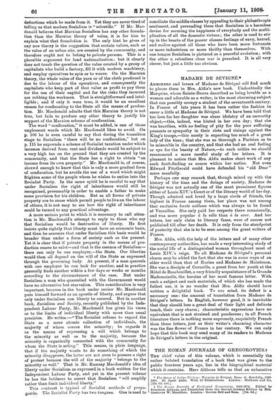MADAME DE SEVIGNE.*
ADMIRERS and lovers of Madame de Sevigne will find much to please them in Mrs. Aldis's new book. Undoubtedly the Marquise, whom Sainte-Beuve described as being lovable as a woman and adorable as a writer, is the most charming subject that can possibly occupy a student of the seventeenth century. In France of late years it has been rather the fashion to sneer a little at Madame de Sevigne. We have been told that her love for her daughter was sheer idolatry of an unworthy object,—this, indeed, was hinted in her own day; that she was heartless, with no feeling of pity for the poor suffering peasants or sympathy in their riots and risings against the King's troops,—this surely is expecting too much of a great lady of the time; that she was so thorough a Parisian as to be miserable in the country, and that she bad no real feeling or eye for the beauty of Nature,—to such critics we should recommend a more careful study of her letters. It is pleasant to notice that Mrs. Aldis makes short work of any such fault-finding as comes within her notice. Not even Edward FitzGerald could have defended his "old Dear" more manfully. Perhaps one may remark that, though mixed up with the history of the time and the doings of society, Madame de Sevigne was not actually one of the most prominent figures either of Louis XIV.'s Court or of the literary world of her day. Though admired and loved by a large circle of friends, the highest in France among them, her place was not among that exclusive haute noblesse which was always to be found at Versailles. She only paid her respects there occasionally, and was more popular a /a trills than a la cour. And her letters, her only claim to literary fame, were of course not published till after her death. It is only from the standpoint of posterity that she is to be seen among the great writers of France.
Mrs. Aldis, with the help of the letters and of many other contemporary authorities, has made a very interesting study of the social life of a distinguished woman throughout most of Louis XIV.'s reign. To all Madame de Sevigne's personal charm may be added the fact that she was in some ways of an elder world than that of Racine and Madame de Maintenon. She was a disciple of Corneille, a guest from her youth at the Hotel de Rambonillet, a very friendly acquaintance of la Grande Mademoiselle, the heroine of her most famous letter. With such a subject and such materials, of which she has made the fullest use, it is no wonder that Mrs. Aldis should have written a delightful book. To our mind, its defect is a necessary one: the amount of translation from Madame de Sevigne's letters. In English, however good, it is inevitable that they should lose a great deal of their light and delicate touch, their racy charm; characteristic expressions have no equivalent that is not strained and ponderous; in all French literature there is nothing more supremely, exquisitely French than these letters, just as their writer's charming character was the fine flower of France in her century. We can only hope that this book may send many of its readers to Madame de Sevigne's letters in the original.










































 Previous page
Previous page